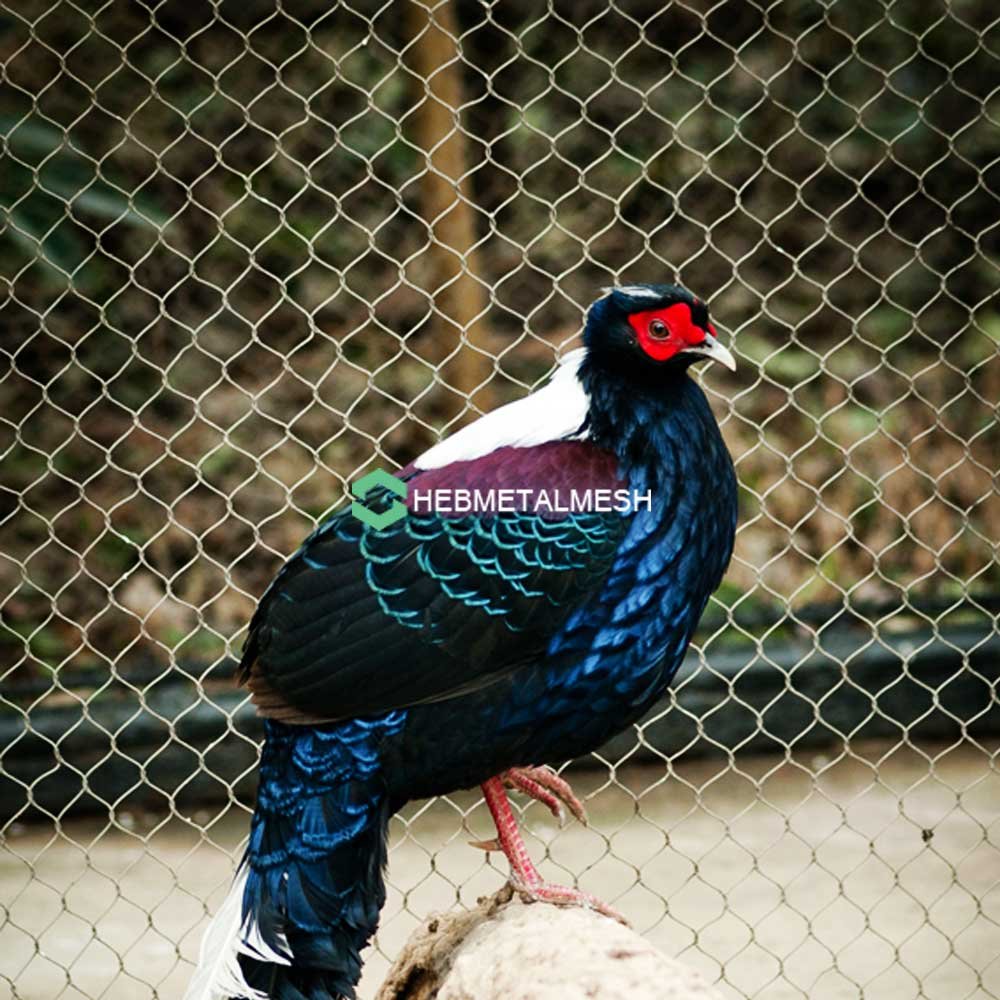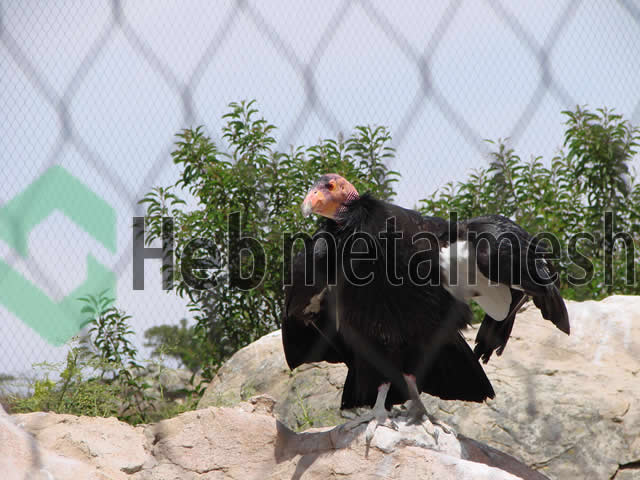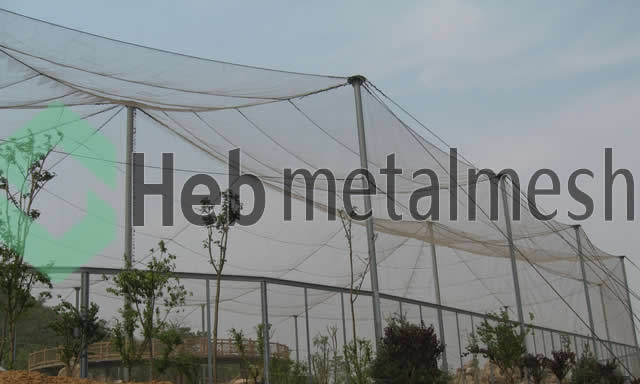Introduction to Wire Chicken Fencing
Wire chicken fencing serves as an essential component for both farming and residential settings. Its primary function is to protect poultry from potential predators while simultaneously providing a secure environment for chickens to roam freely. The importance of wire chicken fencing cannot be overstated; it acts as a physical barrier that not only safeguards livestock but also ensures the overall productivity of a farm or home-based chicken-keeping venture.
There are various types of wire chicken fencing available in the market, each designed to cater to specific needs. The most common options include welded wire, hexagonal wire, and electric fencing. Welded wire presents a robust and long-lasting solution, often preferred by many farmers due to its strength and resistance to damage. Hexagonal wire, on the other hand, is lighter and easier to handle, making it suitable for smaller operations or backyard setups. Electric fencing adds an extra layer of security, deterring predators through a mild electrical shock while keeping the chickens in securely.
Durability is a standout feature of wire chicken fencing, designed to withstand various weather conditions ranging from heavy rainfall to intense sunlight. Many products in this category are coated with protective materials to prevent rust and corrosion, extending their lifespan significantly. Furthermore, wire chicken fencing is cost-effective, providing a reliable solution without imposing significant financial burdens on farmers or homeowners. Easy installation contributes to its appeal, as most types can be set up quickly, allowing chicken-keepers to focus on other essential aspects of poultry management.
In sum, wire chicken fencing offers a robust and versatile solution for practitioners in both agricultural and residential environments. Its effectiveness in safeguarding chickens while ensuring sustainable operations makes it a preferred choice for many enthusiasts in poultry farming.
Benefits of Choosing Wire Rope Mesh

When selecting fencing solutions for agricultural or residential spaces, wire rope mesh presents numerous advantages, particularly when compared to traditional fencing options. One of the most significant benefits is its remarkable resilience against extreme weather conditions. Unlike wood or vinyl fencing, which can warp, crack, or rot over time due to rain, snow, or intense sunlight, wire chicken fencing remains intact and functional. This durability makes it ideal for regions prone to harsh climates or fluctuating temperatures, ensuring that your investment stands the test of time.
Furthermore, wire rope mesh is notable for its longevity, often lasting up to 30 years with proper installation and care. This extended lifespan contributes to its cost-effectiveness by reducing the need for frequent replacements or extensive repairs. Traditional fencing materials may offer a lower upfront cost, but the long-term investment in wire mesh fencing is often more economical. The financial implications of constant maintenance, repairs, or replacements in other fencing types can add up, making wire rope mesh a financially savvy option.
Another compelling advantage of wire chicken fencing lies in its minimal maintenance requirements. Once installed, it demands far less attention than wooden or plastic alternatives, which often need regular painting, staining, or replacement of damaged sections. Wire rope mesh typically requires just an occasional inspection to ensure structural integrity, and any needed adjustments can usually be addressed with minimal effort. This ease of maintenance allows property owners more time to focus on other essential tasks, contributing to greater overall efficiency.
In conclusion, the benefits of wire rope mesh fencing clearly outweigh those offered by traditional fencing options. Its exceptional durability against harsh weather, longevity, and low maintenance make it an appealing choice for anyone looking to secure their farm or home efficiently and cost-effectively.
Understanding the Specifications of Wire Chicken Fencing
When selecting fencing materials for your farm or home, the specifications of wire chicken fencing play a crucial role in determining its effectiveness and longevity. One commonly preferred specification is the 2” x 3/64” mesh size. This particular configuration offers an optimal balance between strength and affordability, making it a favorite among both amateurs and professional farmers alike.
The dimensions of the mesh are critical. A 2-inch mesh opening allows for adequate ventilation while keeping small predators at bay. It is small enough to deter intrusion from typical barnyard pests, while still large enough to facilitate airflow. Farmers often find that this design helps maintain a healthy environment for their chickens by reducing moisture buildup, which can lead to diseases.
On the other hand, the gauge of 3/64” is considered ideal for ensuring structural integrity. When combined with the 2” spacing, this gauge provides sufficient sturdiness to withstand various environmental conditions without succumbing to rust or warping. This specification is particularly advantageous for those in regions that experience extreme weather changes. A robust wire chicken fence can better protect livestock from harsh elements, thereby reducing stress and ensuring more productivity in egg-laying and overall health.
In terms of cost-efficiency, wire chicken fencing with these specifications is generally more affordable than heavier gauges or more complex fencing options. The 2” x 3/64” size ensures that you can cover larger areas without experiencing financial strain while still achieving a secure perimeter around your poultry or other farm animals. Thus, investing in wire chicken fencing with these specifications allows for a comprehensive, effective solution tailored to meet the diverse needs of modern farming.
How Wire Chicken Fencing Holds Up Against the Elements
Wire chicken fencing is designed to withstand a range of adverse weather conditions, making it an ideal choice for both farms and homesteads. This fencing solution is constructed with high-galvanized steel wire, which not only provides strength but also ensures longevity when exposed to various elements such as snow, rain, and strong winds. Unlike traditional wood fences that deteriorate over time due to moisture, wire chicken fencing maintains its integrity, providing reliable protection for your poultry.
In regions where heavy snowfall occurs, wire chicken fencing proves to be particularly beneficial. The design allows snow to slide off rather than accumulate, thus preventing bending or breaking that can often plague wooden or plastic alternatives. For instance, many farmers in the Midwest have reported that their wire fencing has withstood blizzard conditions, remaining intact while securing their flocks throughout the harsh winters. These testimonials not only highlight the resilience of wire fencing but also reflect the confidence users have in its performance.
Rain can also pose a challenge to various fencing types; however, wire chicken fencing excels in this regard as well. It is generally rust-resistant, especially when made from galvanized material, ensuring that even in the wettest climates, it does not weaken over time. Many users have shared experiences of maintaining the effectiveness of their wire fencing after severe rainstorms, noting that it remains upright and functional, effectively deterring predators. Strong winds present yet another challenge, but wire chicken fencing is often constructed with a mesh design that allows wind to pass through rather than applying pressure on the structure. This adaptability means it’s less likely to be uprooted or damaged during gales.
With its durability and robust design, wire chicken fencing emerges as the ultimate choice to confront the elements effectively. By providing a secure environment for poultry while standing against nature’s challenges, it reinforces the notion that investing in quality fencing pays dividends over time.
Cost-Effectiveness: Save Money in the Long Run
When considering fencing options for farms and homes, the cost-effectiveness of wire chicken fencing stands out as a compelling choice. Unlike traditional wooden or vinyl fencing, which may require frequent repairs or complete replacement, wire chicken fences typically offer a much longer lifespan. This durability minimizes the need for replacement and, subsequently, the associated costs over time.
Wire chicken fencing is designed to withstand various weather conditions, pests, and animal interactions, making it a strong contender for both urban and rural settings. Homeowners and farmers can invest in a fencing system that will continue to serve its purpose both efficiently and effectively for many years. This longevity translates into significant savings, as less frequent replacements equate to reduced material and labor costs.
Moreover, the maintenance expenditures linked to wire chicken fencing are notably lower than those related to other materials. Wooden fences often require annual treatments, such as sealing, staining, or replacement of rotting sections. Conversely, wire fencing typically only necessitates occasional inspections and minor adjustments. Such ease of maintenance not only conserves financial resources but also allows for a substantial savings in time and labor—an important factor for busy farmers and homeowners.
Furthermore, when evaluating the initial costs, wire chicken fencing is often more affordable than other fencing options. Its simple installation can be carried out without professional assistance, further reducing initial financial outlay. This value proposition solidifies the perception of wire chicken fencing as a wise financial investment, protecting both livestock and property while ensuring that costs remain manageable.
In summary, wire chicken fencing offers a unique blend of durability, low maintenance, and competitive pricing, making it a financially sound choice for anyone considering their fencing options.
Installation Tips for Wire Chicken Fencing
Installing wire chicken fencing can be an efficient way to protect your chickens from predators while ensuring they have ample space to roam and forage. Proper installation is crucial to create a strong and functional barrier. Here are some essential tips to help you through the process.
First, gather the right tools and materials. You will need wire cutters, fencing staples, a hammer, a post driver, a tape measure, and, depending on the terrain, a shovel. Choose high-quality wire chicken fencing, ideally with a mesh size of 1 inch to prevent small animals from entering while keeping your chickens securely contained.
The first step in the installation process is to determine the layout of your fence. Use the tape measure to outline the perimeter where the wire chicken fencing will be installed. Mark the positions of the fence posts, which should be spaced approximately 6 to 8 feet apart for maximum stability.
Next, dig holes for your fence posts, ensuring they are at least 1/3 of the post’s length deep to provide adequate support. Insert the posts into the holes and pack dirt around them to secure them firmly. This step is vital, as insufficiently anchored posts can lead to sagging or misalignment once the fencing is attached.
After the posts are installed, roll out the wire chicken fencing along the perimeter. Use fence staples to attach the fencing to the posts securely. Make sure the fencing is taut and free from any sagging. A common mistake during installation is failing to keep the wire tight, which can lead to gaps that predators could exploit.
Finally, ensure that the bottom of the wire fencing is buried a few inches underground or bent outward at the base to deter digging predators. Regularly inspect the fence for any signs of damage or wear to maintain an effective barrier against potential threats.
Integrating Wire Chicken Fencing into Your Farm or Home Aesthetics
When considering the installation of wire chicken fencing, it is essential to acknowledge its potential to enhance the overall aesthetics of both a farm and home environment. While primarily functional, the visual appeal of such fencing can significantly contribute to the harmony of the landscape. A well-integrated wire chicken fence can seamlessly blend with existing architecture while ensuring that the design aligns with the surrounding scenery.
One approach to achieving an aesthetically pleasing setup is to match the design of the wire fencing with the architectural style of your home or barn. For instance, if your property features rustic elements, opting for weathered or antiqued wire can add a timeless charm. Additionally, choosing fencing in darker tones can complement natural wood and stone materials typically found in agricultural settings, creating a visual cohesion that draws the eye through the space.
Another consideration involves plantings and landscaping. Incorporating climbing plants or flowering vines around the wire chicken fencing can soften its appearance, transforming it into a vibrant feature of your garden. Choosing species that thrive in your climate will ensure a long-lasting display while providing shade and habitat for local wildlife. This thoughtful blending of flora and fencing not only enhances the environment aesthetically but also supports biodiversity.
Moreover, it is crucial to position the wire chicken fencing strategically to frame key views and create defined spaces within your property. This can enhance sightlines, guide visitors through gardens, or section off areas for distinct purposes while appearing purposeful and curated. By taking these design considerations into account, wire chicken fencing can serve both its practical function and its aesthetic contribution, making it a valuable addition to any farm or home.
Frequently Asked Questions About Wire Chicken Fencing
Wire chicken fencing is an integral component for those who wish to secure their poultry. It not only provides safety against predators but also ensures the well-being of the chickens. Potential buyers often have questions regarding various aspects of this fencing type, including maintenance, longevity, and selection criteria. Below, we answer some of the most frequently asked questions to guide you in making an informed decision.
Regular maintenance of your wire chicken fencing is vital to ensure its longevity and effectiveness. Typically, inspection for damage, such as rusting or bending, should be conducted every few months. Cleaning the fencing to remove debris and potential corrosion can also prolong its life. Additionally, checking the integrity of the posts and tightening any loose wires will help maintain a robust barrier for your chickens.
The lifespan of wire chicken fencing depends on various factors, including the material used, the environment it is placed in, and the level of maintenance provided. Generally, a well-constructed wire chicken fence made from galvanized steel can last between 10 to 20 years. Its longevity can be enhanced with routine care and prompt repairs when necessary. Factors such as weather conditions and exposure to moisture will also play a significant role in determining durability.
Selecting the appropriate wire chicken fencing is crucial for ensuring safety and security. When choosing, consider the size of your property and the specific needs of your flock. For smaller areas or to protect against smaller predators, a lightweight wire might suffice. Conversely, for larger farms or regions with larger predators, opting for heavier-duty fencing that can withstand more pressure is advisable. Additionally, the mesh size should be small enough to prevent chicks from escaping while still allowing adequate airflow and visibility.
Understanding these essentials about wire chicken fencing will help you make a more informed purchase. Addressing maintenance routines, lifespan expectations, and selection criteria is key to maximizing your investment in chicken welfare and farm security.
Conclusion and Call to Action
In examining the benefits of wire chicken fencing, it becomes evident that this solution is well-suited for various farming and home scenarios. The durability and strength of wire fencing offer reliable protection for poultry, ensuring they remain secure from predators. This aspect is crucial, as a secure environment leads to healthier birds and increased productivity. Furthermore, wire chicken fencing is often more cost-effective than traditional wooden or electric barriers, providing the same level of security without the associated maintenance costs.
Aside from durability and cost-efficiency, wire chicken fencing is also highly adaptable. Farmers and homeowners can select from various types, such as welded wire, chain link, or hexagonal patterns, depending on their specific requirements. This versatility allows users to tailor their fencing solutions to meet individual circumstances, making wire fencing a pragmatic choice for both small and large-scale operations. Additionally, the ease of installation enables quick setup, minimizing disruptions to daily routines.
Moreover, the aesthetic appeal of wire fencing cannot be overlooked. Unlike bulky wooden structures that may detract from a property’s visual appeal, wire chicken fencing generally blends well with the landscape. This consideration is important for homeowners who value the appearance of their property while ensuring security for their animals.
In summary, wire chicken fencing emerges as the ultimate choice owing to its combination of strength, cost-effectiveness, versatility, and aesthetic appeal. By investing in wire fencing, individuals can enhance the security of their poultry while simultaneously enjoying long-lasting benefits. We encourage you to evaluate your current fencing needs and consider wire chicken fencing as a sustainable and effective solution for your farm or home. Take the first step toward improved security today.



